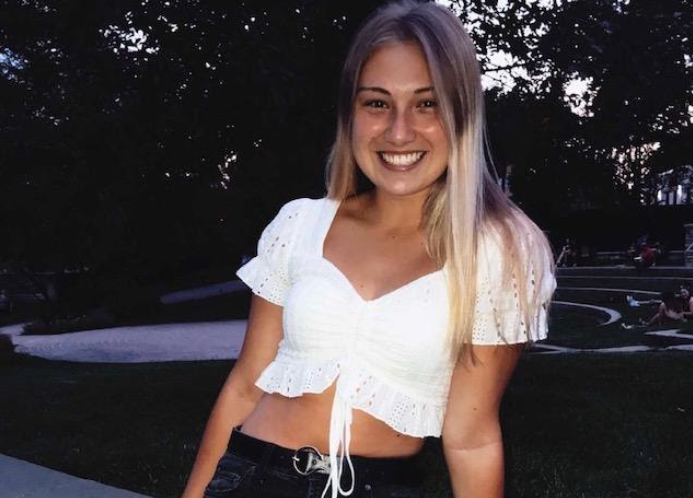Senior Olivia Meyer reflects on summers on Mohawk Indian Reservation
More stories from Nolan Chaidez
Olivia Meyer in downtown Naperville posing for an Instagram picture.
Senior Olivia Meyer’s summer plans aren’t quite one would typically expect. Most girls during the summer hang out and party with their friends, go to the beach and practice their sport. For Meyer though, she spends two weeks of her summer in Franklin County, N.Y. on the Mohawk Indian Reservation to connect with family.
The Meyer family is a part of the Mohawk Indian tribe. Meyer is Native American coming from her mother’s side of the family.
Meyer has been visiting the reservation since 2005, however she has created a special bond
with one girl on the reservation named Lake Moon. Meyer and Lake Moon have taken important beliefs from one another. Meyer took away two meaningful quotes from Lake Moon.
“There’s two people on you and one of them is feeding you good energy and the other one is feeding you negative energy. The one that takes over your body is the one you feed,” Meyer said.
Meyer understands that saying throughout certain situations and challenges in her life. She knows that it’s important to not get involved in the negative ideas of certain things.
“If I look at this in a negative way then it’ll overtake me. If I feed the one doing good and saying good thoughts then that one will be the one that I mostly have to live by,” Meyer said.
Meyer has taken life lessons that she learned on the reservation that she applies in her daily life, and she has also noticed norms on the reservation that differ from her life outside of the reservation. She wishes these norms would be incorporated in her life outside of the reservation.
“It would definitely be the materialistic aspect; I feel like everything here is very materialistic like what you wear, who you hang out with and what you like to buy. As up there it’s not at all like that. The shoes you wear don’t matter, as like here it does and their lifestyle is so much different in that aspect,” Meyer said.
The difference between reservations and non-reservations is drastically different from the materialistic aspect. On the reservation they don’t judge one another based on who they hang out with or what they wear.
Outside of the reservation though, many base themselves on how others may perceive themselves: by the way they look, what they wear and their overall figure. It’s an aspect of pop culture that has been normalized.
Meyer has seen more than just the materialistic aspect. She has been able to identify certain things that the natives do on the reservation that those who don’t live on the reservation may perceive as outlandish.
“On the reservation they don’t have to take pictures of everything and Snapchat everyone to tell them what they’re doing all the time. So I guess their social media presences would be a lot more different, and here I feel like people think that’s weird because it’s a norm for us to post and take pictures and always share what we’re doing and up there people won’t go on their phones for days,” Meyer said.
The natives don’t photograph everything happening on the reservation as they capture the moment in their minds. They focus on the present and not focusing on the past memories they’ve created throughout their life.
Meyer being a non-resident on the reservation has created certain barriers that make it challenging for her to understand what’s going on at certain points.
“I definitely think there is a barrier, because obviously, I’ve lived here [Downers Grove] my whole life except for one week. When I sit there I think my lifestyle kinda rubs off and shows off so I feel like I can’t really fully understand their lifestyle so I’d have to actually live with them. Living off the reservation is the barrier I have when being on the reservation,” Meyer said.
The barrier presented at Meyer is the challenge that makes it harder to understand what exactly is going on when she is on the reservation. Being presented with the idea of moving and adapting to the reservation is the idea to remove the barrier.
“I don’t think I’d take the opportunity because I’m scared that living there every day won’t be as special to me and I wouldn’t be able to see the difference between living here and being there. I feel I’ve always wanted something to have value and I never want to take it for granted if I lived there,” Meyer said.
From cultural barriers to norms that are not incorporated everywhere, the idea to open up about how different the Mohawk Indian Reservation is compared to the home life in a non-reservation lifestyle. Meyer has expressed from her personal experiences what it’s like to be Native American as well as give us a glimpse into the reservation life.

